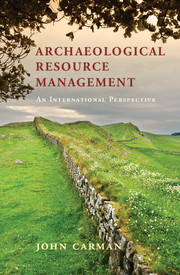5 - Evaluation
from Part II - Practices
Published online by Cambridge University Press: 05 September 2015
Summary
If inventory is a vital first step in managing cultural resources, then giving a value to those resources is the central practice of ARM on which all subsequent practices depend. Debate concerning the ways in which values adhere to archaeological material and the kinds of values that are relevant is currently (late 2014) going through a period of revival. It is a topic to which archaeologists and others regularly return, but not constantly: it was a matter of considerable interest in the mid- to late 1980s, then dwindled until 1996, which saw a series of key publications (see, e.g., Bruier and Mathers 1996; Carman 1996; Carver 1996), with a revival of interest in 2005–6 (e.g., Mathers et al. 2005a; Clark 2001; 2006), followed by something of a hiatus until from 2010 a series of further publications (e.g., Smith et al. 2010) and the entry of economic ideas have maintained impetus (Carman forthcoming).
Within periods of interest concern alternates between practitioners, who seek or suggest methods of valuation, and academic commentators, who may suggest their own schemes, which are frequently at odds with those of practitioners. The primary difference between the kinds of valuation preferred or required by practitioners and those offered and discussed by academic commentators is that the former represent a value to be applied to particular components of the archaeological resource – individual sites, places or objects – to allow comparison and decision-making, and the latter represent more generalised concepts to be applied to the archaeological resource as a category. As a consequence the term ‘evaluation’ carries two distinct and separate meanings: for the academic commentator it refers to a primarily analytical process that seeks to understand the phenomena under scrutiny, especially in their capacity as ‘archaeological resource’; for the practitioner it is a primarily descriptive process that seeks to identify the specific characteristics of an individual site or other object. For the former, evaluation is a process worthy of study in its own right and concerned with the kinds of values being applied; for the latter it is a technique that provides data for the future management of particular places. Darvill (2005) conveniently labels these differences as the distinction between ‘value’ systems and ‘importance’ systems: the former are ‘holistic, … have general orientation, largely relate to the production of archaeological resources [i.e., the initial selection of things as “archaeological”], and are conceptual, widespread within the population, and generated with reference to past experience’, while the latter are ‘atomistic, … have specific orientations, are generally pragmatic, relate to the consumption of the resource [i.e., future uses and treatment] … look to the future, have local relevance, and are created and administered by specialists’ (Darvill 2005, 37).
- Type
- Chapter
- Information
- Archaeological Resource ManagementAn International Perspective, pp. 105 - 130Publisher: Cambridge University PressPrint publication year: 2015



